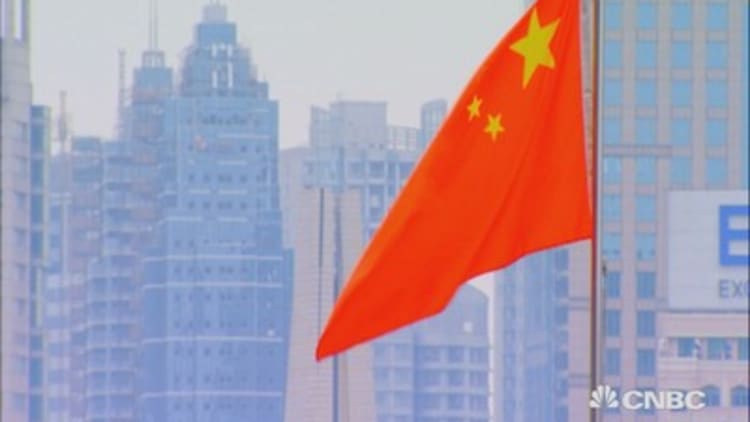China is aiming to expand its economy by around 6.5 percent in 2017 as it continues to implement a proactive fiscal policy and maintain a prudent monetary policy, Premier Li Keqiang said on Sunday.
Top leaders at the National People's Congress are tolerating slightly slower economic growth this year to give them more room to push through reforms to deal with a build-up in debt.
A lending binge and increased government spending last year have fueled worries about high debt levels and an overheating housing market.
Gross domestic product officially grew 6.7 percent in 2016, the slowest in 26 years, but within the government's target range of 6.5 to 7 percent.
That 6.5 percent growth target is "needed to achieve the employment objective," Li said in his prepared remarks.
The government announced ambitious jobs plans, including to ensure that every family has at least one breadwinner, which is key as jobs are cut in major state-owned enterprises.
As the government moves away from manufacturing-led growth, Beijing is tasked with quickly finding new employment for millions of workers, or risk the possibility of social unrest as unemployment looms
China says it expects 11 million new urban jobs will be created this year, but that still wont keep pace with the 15 million new workers the government estimates will enter the market, according to prepared remarks. The government will continue to focus on the coal and steel sectors, with plans in place to cut steel production capacity.
But experts were skeptical of the idea that certain economic growth levels would be "needed" for employment reasons.
"There is not now nor has there ever been any magical connection between GDP and jobs. You can have capital-intensive 6.5 percent GDP growth and not create enough jobs and you can have 3.5 percent labor-intensive GDP growth and create more than enough jobs," said Derek Scissors, a resident scholar at the American Enterprise Institute and chief economist of the China Beige Book. "The Chinese government's position for the past 20 years has been that the nutrition content of food doesn't matter at all, only the number of calories."
"This doesn't make any sense economically, but it's perfectly clearly politically," he said, noting that China had said it needed greater GDP growth when its labor force was actually expanding, as opposed to its current contraction.
Although GDP growth is a widely-watched metric for divining the state of the Chinese economy, that measurement is also routinely questioned by outside experts.
There has never been definitive evidence that the country's economic data is exaggerated, but the widely-held theory says that China's National Bureau of Statistics will overstate growth in a stability-minded effort to hide the truth about a slowing economy. So instead of relying on government reports, China-watchers analyze other metrics for a more complete picture of the country's GDP.

"We watch (the official GDP announcement) as closely as we do in some sense out of a sense of obligation," Donald Straszheim, head of China Research at Evercore ISI, told CNBC in 2016.
Li also said in remarks prepared for delivery at the opening of the annual meeting of parliament that China will push forward with supply-side reforms this year and achieve new progress in structural adjustments in key areas.
China will also take steps to control risks and ensure safety in the financial sector, the premier said.
China should have higher levels of vigilance against risks from non-performing assets, debt defaults, shadow banking and internet finance, Li said.
It will steadily push forward with de-leveraging this year, mainly in the non-financial corporate sector, he added.
China also plans to push forward with asset securitization and debt-to-equity swaps this year.
China will continue to implement a city-based policy to reduce real estate inventories, mainly in the third and fourth-tier cities, Li said.
On Sunday, the country also set a budget deficit target of 3 percent of gross domestic product for 2017, the finance ministry said in its work plan, in line with the target set a year earlier.
China set a fiscal deficit target for the year of 2.38 trillion yuan ($345.16 billion). Last year, Beijing set a 2016 budget deficit target of 3 percent of GDP.
Notable targets from Li's prepared remarks on Sunday:
- China targets 2017 GDP growth target of around 6.5 percent
- China targets 2017 CPI target of around 3 percent
- China targets 2017 budget deficit target at 3 percent of GDP
- China targets 2017 M2 growth target of around 12 percent
Li also said in his prepared remarks that China will resolutely oppose and contain Taiwan
independence activities.
"We will never tolerate any activity, in any form or name, which attempts to separate Taiwan from the motherland," Li said.
Li additionally commented that the notion of Hong Kong independence would lead nowhere and China would strengthen its maritime and air defense capabilities.
—CNBC's Sophia Yan and Everett Rosenfeld contributed to this report.

